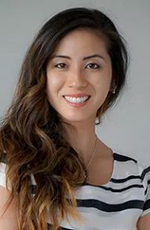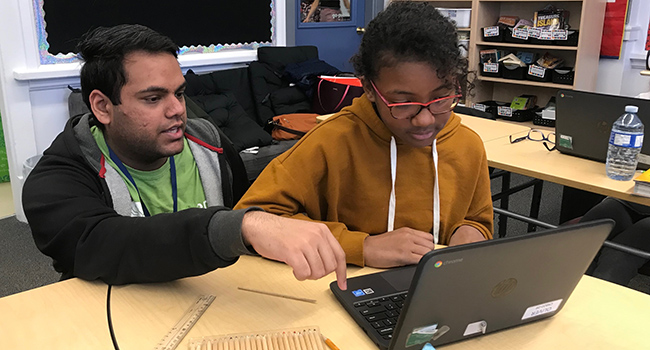U of A graduate students are teaching Edmonton elementary students how to write computer code for simple games and apps.
The coding may be simple – just a few instructions enabling a computer to calculate whether it’s too cold for recess, for example – but the logic is the same as you find in more sophisticated software that runs our increasingly digital world.
“It might not look like adult text-based coding, but it’s still learning how to sequence instructions,” said Jennifer Lam, creator of Discover Coding, a local startup that since 2017 has introduced coding instruction in more than 30 Edmonton-area schools.

Jennifer Lam, creator of Discover Coding
“It’s computational thinking and these skills are so vital wherever they go in life,” said Lam, who is also a U of A computing science and education graduate. For students who decide to learn a computer language later on, “when they get to the text based stuff, it comes a lot easier.”
Three of Lam’s instructors are graduate students with experience in coding, hired through the U of A’s Graduate Student Internship Program. Muhammad Bilal, a master’s student in mechanical engineering, applied to join Lam’s team shortly after arriving at the U of A from Pakistan last September.
“I always wanted to be part of a change,” said Bilal, “and I think 10 years from now the entire economy is going to change, from oil and gas in Alberta, for example, to more IT-based, which is actually the future of everything.
“The kids may not fully understand it yet, but they respond to patterns. We try to focus on that, and show them if you do this, that happens, and encourage them to play around with it.”
Lam created Discover Coding with her husband, Johnny Huynh, another U of A computing science grad, after working for a number of years on satellite technology for space agencies around the world.
She enjoyed that work, especially the challenge of solving difficult problems, but felt something was missing. She grew up in a family that started a few local private schools, and her mother was a teacher, so it wasn’t a huge stretch to return to the U of A for an education degree.
Her own young children were her “guinea pigs” for coding instruction, she said, and she was amazed at how quickly they picked up the fundamentals.
She tried it out in local schools, introducing coding to students in Grades 5 to 8, one or two hours a week for six to eight weeks. Her approach was inspired by Hour of Code, a global initiative to promote coding, using a tutorial program called Callysto that teaches computational thinking.
The students begin the course by manipulating symbols in a brief sequence – a stick figure walking with an arrow pointing right, followed by a figure jumping up, then another with the figure walking left.
“Then we might get them to create a little program to check password strength, making associations to things useful for their everyday lives,” said Lam.
Eventually the students are introduced to the basics of Python, a commonly used programming language.
“It’s like Lego,” said Bilal. “Once you know how to fit the pieces together, you can build anything you want. At this stage, they don’t have to understand why the pieces fit together, as long as they know how they fit together.”
The aim of the course, said Lam, is to teach useful skills such as problem solving, abstraction and pattern recognition, while giving students a fun break from their everyday curriculum.
“They love the whole creation part of it,” she said. “Coding is really just like a tool to express an idea you have.”
So far the response in schools has been encouraging, said Lam. Teachers love the enrichment the program offers, and Discover Coding’s client load has more than doubled every year since 2017. Since the beginning of the COVID-19 pandemic, however, the program has moved online.
“Since all of the COVID restrictions, schools have shown a need to have engaging online programs to provide for their students,” said Lam.
The instructional team has grown to 14 part-time instructors, three currently hired through the university’s internship program. Seven U of A graduate students in total have worked for the company.
Bilal said the horizon has opened up as much for him as for the kids he’s teaching.
“It’s made me realize I want to keep all of my options open. When I look at things now, I just see opportunity.”
| By Geoff McMaster
This article was submitted by the University of Alberta’s online publication Folio, a Troy Media content provider partner.
The views, opinions and positions expressed by columnists and contributors are the author’s alone. They do not inherently or expressly reflect the views, opinions and/or positions of our publication.

